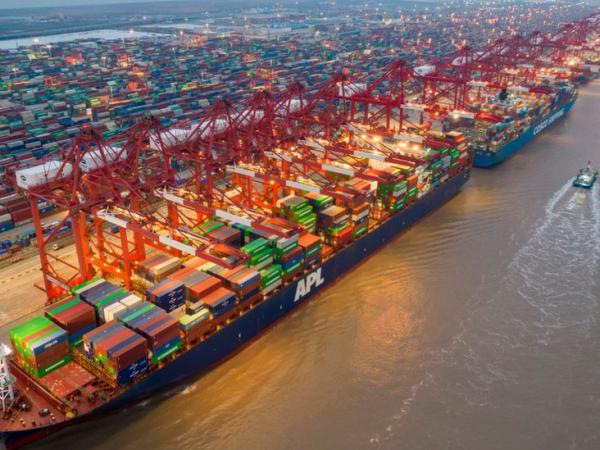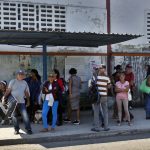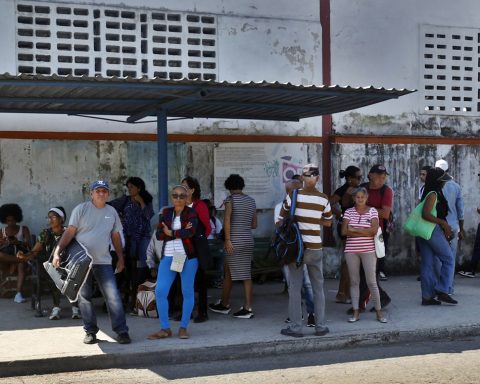Dozens of Chinese cities are under partial or total confinement these days, after a new surge in coronavirus cases in the Asian giant that threatens the authorities’ controversial “zero covid” strategy.
Due to the spread of the omicron variant, Shanghai, with 25 million inhabitants and a vital weight for the country’s economy, is suffering the worst wave since the one that originated in Wuhan more than two years ago.
But this Chinese metropolis is not only a global financial center, it is also one of the most important freight ports for international trade.
In 2021 it accounted for 17% of China’s container traffic and 27% of China’s exports, and has been the world’s largest port for the past 10 years.
However, the confinement to which the city is subjected makes it difficult for the trucks that have to take the goods by road or distribute them to nearby factories to arrive. Many, like Volkswagen or Tesla, had to stop their activities.
“The restrictions mainly affect the roads in and out of the port, resulting in a backlog of containers and a 30% reduction in productivity,” explains Mike Kerley, investment manager at firm Janus Henderson.
Added to this is the shortage of port workers who process the necessary documents for ships to unload their merchandise or inspect it previously.
The first problem is the boats are piling up off the coast and in the channels around the port waiting for the green light.
VesselsValue data demonstrates how waiting times for tankers, bulk carriers and container ships have risen steeply.
The second of the problems is that thousands of containers are piling up in the port, once again putting the global supply chain in check just when analysts were confident of its recovery after what happened during the pandemic.
The European Union Chamber of Commerce estimated that there were 40% to 50% fewer trucks available.
And less than 30% of the Shanghai workforce could return to work.
Under the measures imposed by China in this new wave, everyone who tests positive for the virus, even if they have no symptoms, must be quarantined in centralized facilities where many people have complained of poor conditions.
And while the world’s largest container port remains operational, experts say it is becoming increasingly clogged.
The main products exported through Shanghai include washing machines, vacuum cleaners, solar panels, electronic components and textiles.
“Temporary shortages could be apparent for these products, as export through Shanghai accounts for 30-50% of China’s total exports of these products,” Janus Henderson’s Kerley said.
“Containers are piling up in the port of Shanghai,” Ocean Network Express, a Japanese container shipping and transportation company, told clients.
“The situation has not improved since our last update on April 6. Road transport remains limited and terminals are still congested, while the connection capacity of the refrigerated zone remains very strained,” the company said.
The world’s largest shipping company Maersk also issued a statement this week saying “several ships will skip the port of Shanghai on their routes” due to a shortage of available container space.
The global consequences will not wait: strained supply chains, slow flow of imports and a rise in inflation.
“There is a lot of concern that exports will be affected and of the inflationary impact in the world, including Latin America, which is a great trading partner of China,” says Alicia García-Herrero, chief economist for Asia Pacific at investment bank Natixis.
“Because the capacity of the port is not the same as in March, nor in February, it will take some time to resolve all of that. Even if the city lockdown ends tomorrow, there is a capacity backlog that will not be resolved quickly,” Rodrigo Zeidan, Professor of Economics and Finance at NYU Shanghai, told BBC Mundo.
“Inflation will be here for a while. Prices of many goods will take some time to stabilize,” Zeidan added.
For their part, Bank of America experts believe that the most severe impact is likely to be seen during the month of April.
“Although the authorities already noticed the problems and began to take measures in recent days […] These outages are likely to spread across the globe within 3-6 weeks and last through at least the end of the second quarter,” they state in a report.
The effect in Latin America can be twofold, Zeidán believes.
First in terms of economic activity, he says, since even if there is demand from China for all the raw materials it imports from Latin America, the shipments will not be easy to make.
“This is already happening. Shipping rates are staying absurdly high for a long time and prices are actually going up.”
And second, inflation will go a little higher than where it is now.
However, several of the experts consulted believe that considering the importance of the port of Shanghai for China’s trade, the restrictions are unlikely to last long.
And that the Government does everything possible to return to normality as soon as possible.
For Zeidan the situation should improve by mid-May.
Remember that you can receive notifications from BBC Mundo. Download the new version of our app and activate it so you don’t miss out on our best content.
BBC WORLD
















